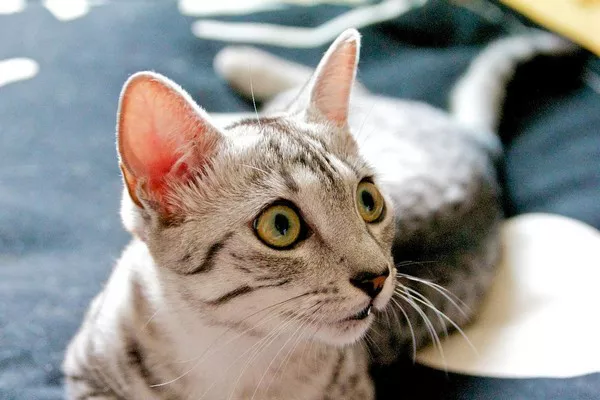Biting is a natural behavior for cats, but understanding why your Himalayan cat may be exhibiting this behavior is crucial for addressing it effectively.
Playful Aggression: Cats, including Himalayans, often use biting as part of their play behavior. However, what may start as playful biting can sometimes escalate into more intense behavior if not redirected appropriately.
Overstimulation: Himalayan cats, known for their affectionate nature, may become overstimulated during petting or handling sessions. Too much interaction can lead to irritation, causing them to bite as a means of communication.
Fear or Anxiety: Like all cats, Himalayans may resort to biting when they feel threatened or anxious. Loud noises, unfamiliar environments, or changes in routine can trigger fear-based aggression in some cats.
Pain or Discomfort: Underlying medical conditions, such as dental issues or arthritis, can cause discomfort or pain, leading to irritability and biting behavior. It’s essential to rule out any health concerns that may be contributing to your cat’s behavior.
Redirected Aggression: If your Himalayan cat becomes frustrated or agitated by something else, such as seeing another animal outside the window, they may redirect their aggression towards you through biting.
Himalayan-Specific Considerations
Understanding the unique temperament and characteristics of Himalayan cats can provide insights into their biting behavior.
Breed Temperament: Himalayans are known for their sweet and gentle disposition. However, they can also be sensitive and may react strongly to changes in their environment or routine. Biting behavior in Himalayans may be less common compared to some other breeds, but it can still occur under certain circumstances.
Grooming Sensitivity: Himalayans have long, luxurious coats that require regular grooming to prevent mats and tangles. Some Himalayans may be sensitive during grooming sessions, leading to biting behavior if they feel uncomfortable or stressed.
Solutions and Training Tips
Addressing your Himalayan cat’s biting behavior requires patience, consistency, and understanding. Here are some strategies to help manage and prevent biting:
Positive Reinforcement: Encourage desired behaviors, such as gentle play or calm interaction, with treats and praise. Rewarding your cat for appropriate behavior reinforces positive habits and strengthens your bond.
Play Therapy: Provide appropriate outlets for your Himalayan cat’s natural instincts by engaging in interactive play sessions with toys such as feather wands or laser pointers. This helps channel their energy and reduces the likelihood of them resorting to biting during play.
Environmental Enrichment: Create a stimulating environment for your Himalayan cat with toys, scratching posts, and climbing structures. Providing opportunities for mental and physical stimulation helps alleviate boredom and reduces stress-related behaviors, including biting.
Reading Cat Body Language: Learn to recognize signs of overstimulation or agitation in your Himalayan cat, such as flattened ears, dilated pupils, or a twitching tail. When you notice these signs, give your cat space and avoid further interaction to prevent escalation to biting.
Discouraging Biting: If your Himalayan cat does bite, respond calmly but firmly by saying “no” and withdrawing attention. Avoid harsh punishment, as this can worsen fear and anxiety. Instead, redirect their attention to a more appropriate activity, such as playing with a toy.
Seeking Professional Help
If your Himalayan cat’s biting behavior persists or escalates despite your efforts, it may be beneficial to seek professional help:
Veterinary Consultation: Schedule a visit to your veterinarian to rule out any underlying medical issues that may be contributing to your cat’s biting behavior. Your vet can also provide guidance on behavior management and recommend appropriate interventions.
Cat Behaviorist: Consider consulting a certified cat behaviorist for personalized guidance and behavior modification strategies. A behaviorist can assess your cat’s specific needs and develop a tailored plan to address their biting behavior effectively.
In conclusion, understanding the reasons behind your Himalayan cat’s biting behavior is the first step towards finding a solution. By addressing potential triggers, providing appropriate outlets for play and stimulation, and seeking professional guidance when needed, you can help your Himalayan cat develop positive behaviors and strengthen your bond for years to come.
FAQs:
1. Are Himalayan cats aggressive?
Himalayan cats are typically known for their gentle and calm demeanor rather than aggression. However, like all cats, individual temperament can vary. Factors such as socialization, environment, and past experiences can influence a Himalayan cat’s behavior. Generally, Himalayans are affectionate and enjoy human companionship, but they may exhibit aggressive behavior if they feel threatened, frightened, or stressed. Providing a safe and comfortable environment, along with positive reinforcement training, can help prevent aggressive tendencies in Himalayan cats.
2. Why does my cat randomly bite me unprovoked?
There could be several reasons why your cat may bite you seemingly unprovoked. It’s essential to consider factors such as overstimulation, fear, pain, or redirected aggression. Cats may also bite as a form of communication, expressing discomfort or displeasure. Observing your cat’s body language and environment can provide clues to their behavior. Consulting with a veterinarian or animal behaviorist can help identify underlying issues and develop strategies to address your cat’s biting behavior effectively.
3. How do I react to my cat biting me?
When your cat bites you, it’s essential to react calmly and avoid reacting with aggression or punishment, which can escalate the situation. Instead, gently withdraw from the interaction and give your cat space. Redirect their attention to a toy or other appropriate activity to prevent further biting. Avoid reinforcing biting behavior by not engaging in rough play or encouraging aggressive behavior. If biting persists or escalates, consult with a veterinarian or behaviorist for guidance and support in addressing your cat’s behavior.
























